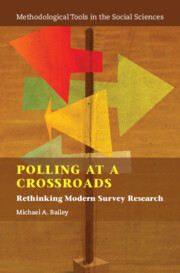
- Cited by 3
-
Cited byCrossref Citations
This Book has been cited by the following publications. This list is generated based on data provided by Crossref.
Bailey, Michael A. 2025. Countering Non-Ignorable Nonresponse in Survey Models with Randomized Response Instruments and Doubly Robust Estimation. Political Analysis, Vol. 33, Issue. 2, p. 140.
Breen, Casey F. and Feehan, Dennis M. 2025. New Data Sources for Demographic Research. Population and Development Review, Vol. 51, Issue. 1, p. 539.
Rosenzweig, Leah R. Bergquist, Parrish Pham, Katherine Hoffmann Rampazzo, Francesco and Mildenberger, Matto 2025. Survey sampling in the Global South using Facebook advertisements. Political Science Research and Methods, p. 1.
- Publisher:
- Cambridge University Press
- Online publication date:
- February 2024
- Print publication year:
- 2024
- Online ISBN:
- 9781108697798


